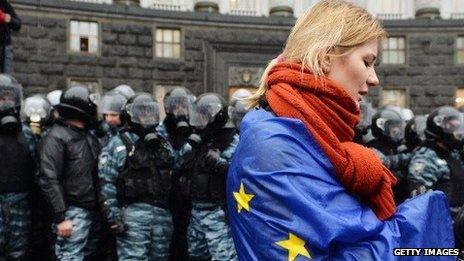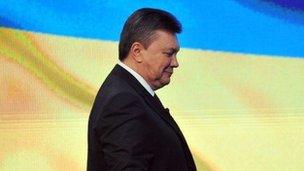Yanukovych's Ukrainian calculus: Power at all costs
- Published
- comments

Tens of thousands have taken to the streets in Kiev to protest Ukraine's decision to back away from an EU agreement
On the eve of the European Union (EU) summit in Vilnius, Lithuania, on 28-29 November, Europeans said the door is still open for Ukraine to sign a historic agreement with the EU.
Kiev, meanwhile, is putting the signing on hold and asking for financial compensation from the EU for trade losses due to economic pressure from Russia.
In August, three months before a scheduled deal-signing with the EU, Russia stopped all Ukrainian imports. Seventy-five percent of Ukraine's machine-building production is exported to Russia. Experts say the losses from Moscow's actions could cost up to $2.5bn (£1.53bn) for just the second half of 2013.
"As soon as we reach a level that is comfortable for us, when it meets our interests, when we agree on normal terms, then we will talk about signing," President Viktor Yanukovych told Ukraine's TV channels on Tuesday. He said that he is still planning to go to the summit to explain Ukraine's position.
In Mr Yanukovych's mind, at least, he may not have closed the door on joining the EU. Many observers were surprised by the news that he told Lithuanian President Dalia Grybauskaite in a telephone conversation last week that Russian economic pressure and blackmail is the reason that Kiev cannot sign the agreement.
Every Ukrainian president since the fall of the Soviet Union has found himself on a complicated geopolitical chessboard between East and West. Each has had to decide how to balance and where to lead the second-largest country in Europe - toward Brussels, which is likely to be the best guarantor of Ukraine's long-term economic prosperity and political development, or toward Moscow, to which Ukraine has cultural and historical ties.
While Ukraine's Baltic and Central European neighbours fully realised their ambition to be in the EU, Belarus sought close ties with Russia. Ukraine, by contrast, has still not made its choice. It remains a country on hold.
Its refusal to sign the agreement (combined with departure of President Mikheil Saakashvili in Georgia) likely means the end of the dream of many Western policymakers of a Europe whole and free. It also probably will encourage the Kremlin more assertively to reintegrate the former Soviet space under Russian authoritarian rule, as many in Kremlin believe Europe is in decline and US power around the world is in retreat.

Yanukovych is less afraid of Brussels than of Moscow, one commentator has said
"The US always believed that democratic freedoms are universal values and events that happen in Europe influence us," said Kurt Volker, former US ambassador to Nato and now executive director of the McCain Institute of International Leadership in Washington DC. "Ukraine is a part of Europe, and it's important not to allow those who want to separate Ukraine from it to do this."
Ariel Cohen from the Heritage Foundation writes: "It is in the national interest of the United States to prevent Ukraine from becoming a Russian satellite and a key member of a Moscow-dominated sphere of influence. Ukraine is more democratically oriented than Russia. Historically, it has closer ties with Europe; and geopolitically, it can provide a necessary check on Russia's imperial ambitions."
There are several conclusions we can draw from the current status of the EU-Ukraine negotiations:
-Ukrainian leadership may not yet be ready either to democratise the country or integrate Ukraine into European economic and security institutions. However, the Ukrainian population - even in the Russian-speaking east of the country - is increasingly supportive of Ukraine joining the EU.
-Mr Yanukovych, who is supported by less than half the population, wants to ensure he stays in power. Many Ukrainian experts believe that he tried to play off Russia and the EU in order to maximise his chances of re-election in 2015. To achieve this he needs either a successful agreement with the EU, which would broaden his political base, or Russian President Vladimir Putin's help in consolidating his authoritarian rule.
-While Ukraine has for now picked the short-term benefits of improving trade ties with Russia over the long-term benefits of association with Brussels, it still refuses to join Mr Putin's Customs Union, which could lead to further integration with Moscow.
Serhiy Rahmanin of the Ukrainian newspaper Mirror Weekly writes: "Yanukovych is less scared of Brussels than [of] Moscow." Mr Putin wants to build a new USSR, he contends, which would cost Mr Yanukovych real power.
For now Mr Yanukovych will attend the Vilnius gathering this week, where he hopes to discuss possible "three-way consultations" among Ukraine, the EU and Russia, and conduct talks that would be "in the best interests of Ukraine".
Whether EU representatives are prepared to listen after months of frustrating negotiations is another matter.